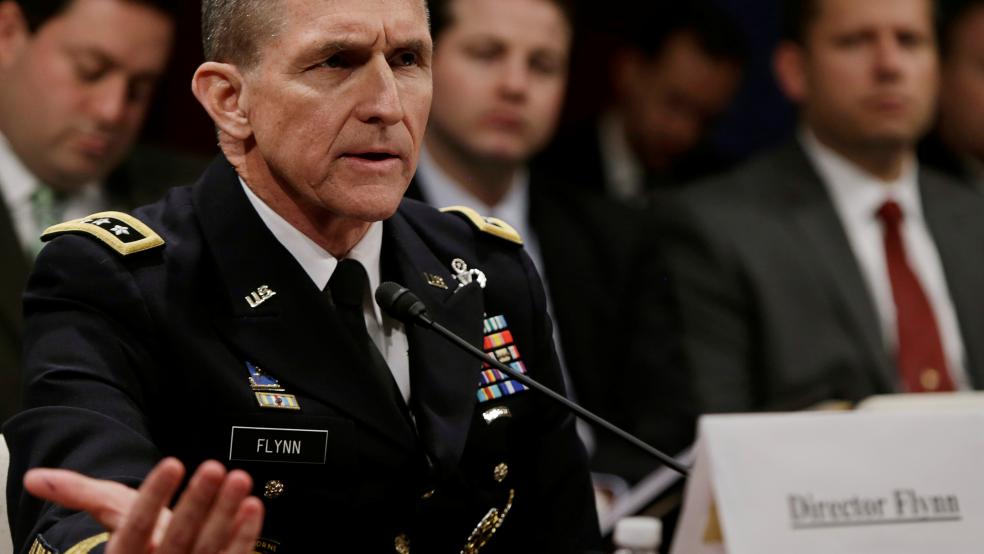The resignation of White House National Security Adviser Michael Flynn Monday night, just hours after one of President Trump’s closest advisers said that he enjoyed the chief executive’s “full confidence,” raises alarming questions about the new administration’s ability to put national security ahead of the president’s personal ties to his aides.
Flynn, the retired three-star Army general who rose to prominence in Trump’s orbit during the presidential primary, bowed out after weeks under a cloud of suspicion that he had illicit contact with Russian officials prior to Trump’s inauguration and may have suggested that sanctions levied on the Kremlin by then-president Obama would be eased after Trump took office. Matters worsened after it was revealed that Flynn misled the administration, including Vice President Mike Pence, about the content of his discussions with a Russian official.
Related: National Insecurity: Intel Officials Increasingly Worried About Trump
If the fact that Flynn was allowed to remain in the position after apparently lying to Pence wasn’t troubling enough, it was reported Monday night that the Department of Justice had previously informed the White House that it believed the National Security Adviser could be subject to blackmail by Russia.
Acting Attorney General Sally Q. Yates informed the White House in late January that an ongoing investigation into Flynn’s ties to Russia had revealed that the Kremlin might have undue influence over the man charged with briefing the president on the most serious and sensitive issues of national security. Yates was fired by the president shortly thereafter, over her refusal to implement his executive order banning refugees and citizens of seven majority Muslim countries from entering the US.
Despite the Justice Department’s concerns, and in the face of other reports that the Army is investigating whether Flynn broke the law by accepting payment from the Kremlin-run RT television channel for an appearance in Moscow, Flynn retained access to the nation’s most closely held secrets and, according to aides, to the president’s trust.
“Yes, Gen. Flynn does enjoy the full confidence of the president,” White House counselor Kellyanne Conway said in an appearance on MSNBC just hours prior to the announcement of Flynn’s resignation.
Related: How Long Can Trump Go Without Firing Somebody?
Conway’s comment was followed, minutes later, by a seemingly contradictory statement from White House Press Secretary Sean Spicer, who told reporters that the President was “evaluating the situation” with Flynn.
Under normal circumstance, the resignation of a National Security Adviser under suspicion of being influenced by the country’s biggest rival on the world stage would throw the White House national security operation into chaos. However, by all accounts, it was already there.
Career staff on the National Security Council were already frantic with concern about their status within a new administration in which young staffers with virtually no experience in national security affairs were allowed to chair their meetings, and political staff, from the president on down, treated some classified material in a strikingly cavalier fashion.
The White House reported Monday night that Flynn’s position will be filled on a temporary basis by another retired general who supported Trump on the campaign trail, Keith Kellogg. Like Flynn a former Lieutenant General, Kellogg had been serving as his predecessor’s deputy but is not widely expected to hold the job on a permanent basis.
Related: Another Strike Against National Security Adviser Michael Flynn
One of the many questions now facing the Trump administration is where the president will turn for Flynn’s replacement. With the administration’s relationship with the Intelligence Community already in tatters over his repeated accusations that the nation’s spies have acted against him personally, the IC will surely be watching closely to see if Trump looks for a candidate who can repair their damaged confidence in the administration.
Beyond that, the nation as a whole will be watching to see how -- and if -- Trump addresses reports that he allowed an aide potentially compromised by a hostile foreign power to retain access to the nation’s most closely guarded secrets and influence over how the government acts on them.
Trump has shown little willingness to address the Flynn issue. In separate press conferences in recent days, he has accepted questions only from friendly news outlets, like the Daily Caller website and Sinclair Broadcasting, which could be counted on not to bring up Flynn.
However, at this point, it’s difficult to see how even the most obsequious reporter could fail to demand an explanation for the Flynn affair from the president and his representatives.





